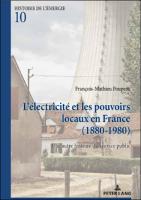L’électricité et les pouvoirs locaux en France (1880–1980)
Une autre histoire du service public
Abstract
L’électricité, un service public jacobin ? À rebours des idées reçues, cet ouvrage montre le rôle joué par les pouvoirs locaux dans la construction de ce qui est devenu un pilier de l’État-Providence en France, au XXe siècle. Cette influence, peu abordée dans l’historiographie, doit être mise en regard avec les origines du secteur électrique : un système sociotechnique ancré et organisé au niveau communal. Jamais effacée, cette « matrice » a façonné de manière durable la gestion du service public. Elle explique le maintien de plusieurs prérogatives locales au moment de la nationalisation (concessions de distribution, régies municipales et départementales, etc.). Elle éclaire la prise de certaines décisions après la création d’Électricité de France, en matière de redistribution sociale (soutien aux usagers domestiques) ou d’aménagement du territoire (péréquation des prix, électrification rurale). En exhumant l’action des pouvoirs locaux et de leur principale organisation représentative, la FNCCR (Fédération nationale des collectivités concédantes et régies), cette autre histoire du service public, racontée « par le bas », nuance la vision d’un État hégémonique. Elle permet aussi de mieux appréhender les mutations actuelles du secteur électrique, à l’heure où les questions de décentralisation refont surface dans les débats politiques.
Keywords
Economic history; Political economy; European historyDOI
10.3726/b13060Publisher website
https://www.peterlang.com/Publication date and place
Bern, 2018Series
Histoire de l’énergie/History of Energy, 10Classification
Industrialisation and industrial history
Public administration
Energy, power generation, distribution and storage


 Download
Download